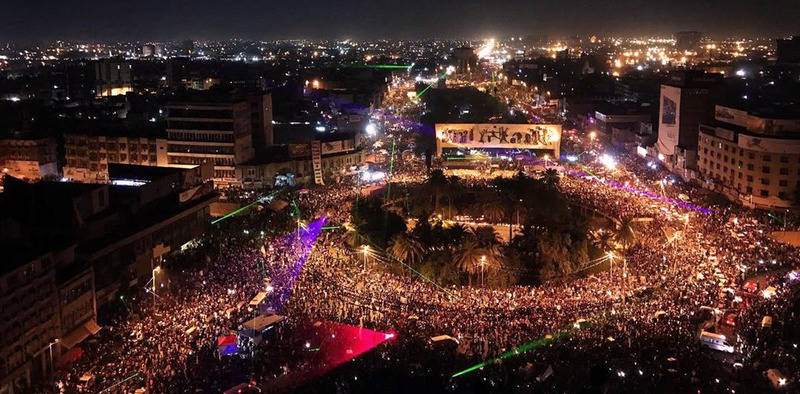Amidst Protests, Iraqi Parliament Endorses New Electoral Law

“In the name of Iraq and in the name of Iraqi people, in the name of martyrs, in the name of all those who sacrificed, and in the name of the displaced, the law has been approved.”
The Iraqi Parliament endorsed on Tuesday a new electoral law that allows individuals to select individual candidates rather than parties’ representatives in response to mass protests that have overtaken the country since early October, with more than 450 protesters killed and dozens of thousands others wounded.
The new law enables voters to opt for individual lawmakers, rather than selecting those who belong to various political parties across the country.
It also allows individual candidates to represent a specific district, instead of groups of lawmakers to represent entire provinces.
“In the name of Iraq and in the name of Iraqi people, in the name of martyrs, in the name of all those who sacrificed, and in the name of the displaced, the law has been approved,” Speaker of the Council of Representatives Mohammed aL-Halbousi told Al Jazeera after the law was voted in on Tuesday.
Under mass pressure, Iraqi Prime Minister Adel Abdul Mahdi resigned from his post last month, but will remain as caretaker of the cabinet until a new Prime Minister is elected.
Over the past few weeks, Iraqi people’s representatives have failed to choose a new Prime Minister, despite a series of deadlines that have so far expired.
Iraqi protesters have also demanded removal of the entire political class and that a new prime minister, with no political affiliation, be chosen.
Protests Persist
In the meantime, many thousands of protesters were reportedly gathered on Tuesday, outside Baghdad’s iconic Liberation Square to protest at, Qusai Alsaheerl, who was nominated by the Iraqi parliament to fill in the post of prime minister.
In addition, protesters in south of Iraq reportedly blocked main roads, entrances of schools, universities and government buildings in some major southern Iraqi cities.
Key Parliamentary Bloc
Meanwhile, head of the Iraqi Parliament Mohammad Alhalbusi handed Iraqi President Barham Saleh an official letter indicating that the ‘Building Coalition’ is the major parliamentary bloc.
Alhalbusi’s letter, according to Sky News Arabia, signals the Iraqi Parliament’s intention to allow the ‘Building Coalition’ to nominate a candidate of their own to take the post of prime minister after Quasai Alsaheel had failed to win majority support for the post.
The allegedly Iran-affiliated coalition involves five Iraqi political parties.
Background
In early October, thousands of Iraqis took to the streets in the capital Baghdad and other Iraqi cities in protest of the one-year-old government of Abel Abdulhadi, which the Iraqis blame for failing to make needed economic reforms.
Government-led security forces fiercely responded to protests, killing around 150 and wounding more than 1,000 others. In response, Prime Minister Abdulhadi pledged some reforms including reducing salaries of high-ranking officials and supporting low-income Iraqi households.
Later in October, protesters returned to the streets after none of the promised reforms were implemented.
Since the 2003 American military invasion of Iraq fell the the regime of former Iraqi President Saddam Hussein, who belonged to the Suni Muslim sect, Iran has restored relations with the neighboring country, where there are some major Shiite-linked Islamic shrines and some key Shiite scholars.
Both Shiite Iran and the Shiite-populated Iraq engaged in an eight-year war in the 1980s under the regime of late Sunni-Muslim Iraqi President Saddam Hussein.











